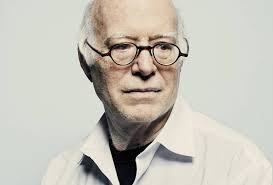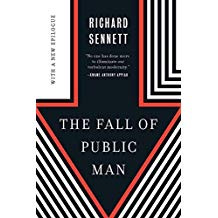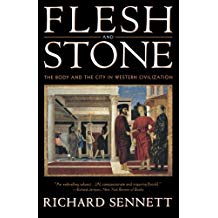I first heard of Richard Sennett through a broadcast on Ideas in the later 1970’s. He was discussing his book The Fall of Public Man which had been published in 1974. The book, in very curt summary, argues that public life has been diminished by the idea that the intimate and the personal is always more intensely “real” than the more formal and artificial gestures which inevitably structure the interactions of relative strangers in public. Sennett was reacting, most immediately, to that current of 1960’s thought which had argued that “the personal is political” and that the path to liberation lay in bringing the private out of the shadows and making it public. But he takes his story back to the 18th century when the public world, in his view, still provided a stage on which people could act at a certain remove from the nagging questions of identity - who am I? - which so dominate contemporary discourse. This public realm, he argues, was undermined by the cult of authenticity which began to take hold in the 19th century and now exerts almost total sway. For me Sennett’s book was an aid to reflection on a topic which continues to preoccupy me today: what do we mean by the word public when we speak, for example, of public broadcasting. At the time The Fall of Public Man appeared, and even more today, most people involved in public broadcasting were in full retreat from any appearance of formality in their broadcasting style. The preferred stance is casual, the preferred tone familiar, as if one were addressing an intimate friend and not, as is actually the case, a distant stranger. Sennett helped me to develop a thought that had already begun to occur to me - that this collapse of the distance between broadcaster and listener might be a dangerous and de-politicizing illusion - the substitution of a self-serving mirage for real community.
The character of public life has been one of two great subjects that Richard Sennett has pursued during a long career as a sociologist. In books like Flesh and Stone, from which I took the title for this series, he has studied the ways in which city life is embodied and experienced, and the ways in which urban form has fostered or inhibited the encounters that, for him, are the glory of urbanity. His second great subject has been work, and the social classes it defines. His 1973 book, with Jonathan Cobb, The Hidden Injuries of Class explored the painful ways in which class is experienced in a society like the United States in which the very existence of social hierarchy is often denied. Later, he studied the new world of precarious and fragmented work in a series of books that began with 1998’s The Corrosion of Character: The Personal Consequences of Work in the New Capitalism, and continued with Respect in a World of Inequality, and The Culture of the New Capitalism, which had just appeared went I went to New York to interview him at his home in Manhattan in 2006. Both subjects are treated in a graceful literary style, in which story-telling takes precedence over the quantitative methods of many of his sociological colleagues. In what follows, Sennett talks about his urbanism in the first episode, and his sociology of work in the second…



